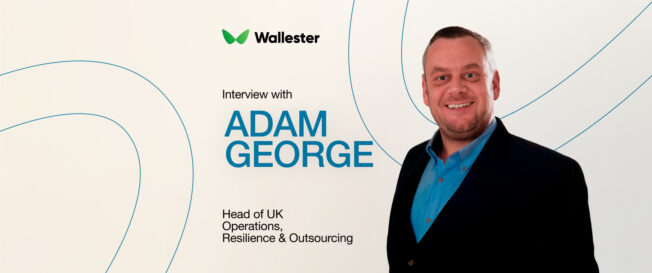After nearly two decades navigating risk, compliance, and operations across some of the UK’s biggest payment institutions, Adam George has joined Wallester as Head of UK Operations, Resilience & Outsourcing. His career has spanned fraud prevention, AML, prepaid innovation, and operational strategy, providing him with the experience to build a robust, scalable UK presence for Wallester. In this interview, Adam shares what drew him into financial crime prevention, why resilience and outsourcing are central to sustainable fintech growth, and how he plans to shape Wallester’s UK operations for the future.
Interviewer: You started in fraud and AML at Barclaycard almost 20 years ago. What drew you into those areas, and what did you learn about how payments actually function on a daily basis?
Adam:I started in fraud and AML at Barclaycard nearly 20 years ago (that makes me feel old now!). What initially drew me in was the fast-paced, high-stakes nature of the work. Fraud and financial crime were—and still are—crucial topics for payments firms and are constantly evolving. I was intrigued by the challenge of staying one step ahead of fraudsters, who are continually finding new ways to exploit the system. I gained a real sense of purpose in protecting customers and the integrity of the financial system.
Working there also taught me the importance of data, including patterns, anomalies, and behavioural triggers, all of which help detect and prevent crime in real time. It gave me a deep appreciation for risk management, system design, and customer trust that I’ve carried throughout my career.
Being new to payments at the time, I quickly developed an understanding of how payments actually function – not just how I saw them as a consumer, but behind the scenes. I learned how every transaction passes through a complex chain of checks and verifications within milliseconds, and how any slight delay or error can impact thousands of transactions and customers.
Most recently, you worked at Pluxee, a world leader in prepaid employee benefits solutions. In this role, you moved from compliance into leading the overall prepaid business. What were the biggest challenges of running prepaid at scale, and how did that prepare you for this new role?
At Pluxee, moving from compliance into leading the prepaid business was both a natural evolution of my compliance and payments background and a shift in perspective to fully understand the detailed operational requirements. I transitioned from a 2nd Line of Defence role, focusing on risk mitigation and compliance, to a 1st Line of Defence role, where I own the full end-to-end client and customer journey. My prior knowledge helped me adapt quickly.
One of the biggest challenges of leading the prepaid business was balancing innovation and client demand with control, especially in a highly regulated space where product development must align with compliance, AML, and operational resilience.
That experience prepared me for this role by giving me a much deeper understanding of how to balance growth, operations, risk, compliance, third-party management, and resilience – exactly the combination that appealed to me about Wallester. It brings all my areas of expertise together.
Now you’re at Wallester. From your perspective, what makes this the right moment to join a fintech and build out the UK operation?
Joining Wallester now feels like the right move because the company is at a fascinating point. From within the industry, I’ve seen Wallester go from strength to strength in Europe. With its expertise and great people, there’s a huge opportunity to build out the business in the UK market, where I believe Wallester is uniquely positioned to meet client and customer demand.
From a personal perspective, it’s the perfect time because I can bring together everything I’ve learned so far and apply it to building the UK operation – a rare opportunity to shape a business and make a meaningful impact in a competitive but opportunity-rich market.
Your title, Head of UK Operations, Resilience & Outsourcing, covers a lot of ground. Can you explain what “resilience” means in practice for Wallester?
It does cover a broad remit, but resilience is really at the heart of everything we do – especially in payments, where uptime, reliability, and trust are non-negotiable.
In practice, resilience means building systems, processes, and partnerships that can withstand disruption – whether that’s technical, operational, or third-party related. It’s crucial that our critical business services continue to operate even in adverse scenarios and that we maintain awareness of any potential risks.
Ultimately, resilience enables Wallester to grow with confidence, serve clients reliably, and meet regulatory expectations without compromise.
Also, outsourcing can mean many things. What’s Wallester’s strategy here? What gets outsourced, what stays in-house, and why?
Outsourcing can cover a broad spectrum – especially in fintech, where many companies rely on partners for essential services, from cloud hosting to customer onboarding checks. Getting the balance right, along with the right oversight model, is critical.
For Wallester UK, we have the additional dimension of Wallester AS being a critical outsourced partner. Regulators like the FCA often view intra-group outsourcing as higher risk than third-party outsourcing, so it’s essential to demonstrate a strong control framework based on testing, reporting, and evidence.
What’s key – and what Wallester fully understands -is that you cannot outsource your risk. The governance remains with us. We manage oversight, performance, and risk frameworks tightly, in line with regulatory expectations. Sustainable growth depends on building a resilient, scalable business without compromising control or compliance.
Why are both such an important focus for payment companies today, and how do you see Wallester approaching it differently?
Beyond being regulatory requirements, resilience and outsourcing are fundamental to sustainable growth. Doing them well builds the trust and performance that clients and customers expect in a payment product.
What sets Wallester apart is how deeply integrated resilience and outsourcing are in our product and operational strategy – not just as compliance checkboxes, but as enablers of scale, trust, and long-term growth.
The UK market is highly competitive in payments and fintech. From your perspective, where do you see the biggest opportunities for Wallester here?
The UK is one of the most competitive payments and fintech markets globally – but that’s what makes it exciting.
Wallester’s modern technology and customer-centric solutions position us to fill gaps that traditional players and legacy issuers are too slow or rigid to address. There’s growing demand from both financial and non-financial brands to launch card programmes quickly and with minimal infrastructure.
Wallester’s API-first platform enables that speed to market and the ability to issue physical and virtual cards with the level of customisation, control, and scalability clients expect – without compromising compliance.
How do you expect resilience and outsourcing strategies to evolve over the next few years, both for Wallester and the wider industry?
In the coming years, both resilience and outsourcing strategies will become even more integral to how financial services firms are assessed, scaled, and trusted.
Resilience planning will need to be more proactive and predictive – focusing on continuous testing, real-time monitoring, and understanding how technology, people, and third parties interact under stress.
Outsourcing will also mature. As providers rely heavily on partners for critical services, oversight and monitoring will become even more important – not just to prevent failure, but to build strong, scalable relationships that enable growth with control.
At Wallester, we already view resilience and outsourcing not just as safeguards, but as enablers of growth. The firms that get this right will be the ones that thrive.
You’ve only just joined, but what excites you most about building the UK business alongside Julian and Anna?
Even though I’ve only just joined, what really excites me is working with like-minded people like Julian and Anna, who are not only extremely experienced in the industry but share the same drive to build something truly great – with strong foundations, strong leadership, and huge potential.
Your career has always revolved around risk and resilience. How do you personally stay resilient – and what do you do outside of work to switch off?
Very true — my career has always centred around risk, compliance, operations, and resilience, so staying personally resilient is something I take seriously. Over the years, I’ve learned that it’s not just about managing pressure but managing energy – knowing when to push, when to pause, and how to keep a clear head even in fast-moving situations.
Reflection helps a lot. Even when things are busy, I take time to step back and make sure I’m not just reacting but staying aligned with the bigger picture. That’s helped me stay resilient through major change projects and the occasional curveball.
Outside of work, golf is my go-to way to switch off. It’s one place where I can be completely present – no emails, no calls, just focus, fresh air, and the occasional bit of UK sun. It gives me that mental reset and space to recharge. Honestly, while it can sometimes be frustrating, it’s taught me a lot about patience, discipline, and staying calm under pressure – lessons that translate surprisingly well back into the workplace. And yes, I’m hoping to represent Wallester at the next Visa golf event!


